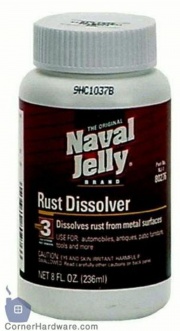Difference between revisions of "Naval Jelly Rust Dissolver"
(username removed) |
|||
| (3 intermediate revisions by 2 users not shown) | |||
| Line 2: | Line 2: | ||
== Description == | == Description == | ||
| − | [Loctite] A registered trademark for a commercial rust remover. Naval Jelly contains [ | + | [Loctite] A registered trademark for a commercial rust remover. Naval Jelly contains [[water|water]] (65-70%), [[phosphoric acid|phosphoric acid]] (25-30%) and [[sulfuric acid|sulfuric acid]] (1-3%) in a gel matrix composed of a thixotropic polysaccharide (1-3%), [[isopropyl alcohol|isopropanol]] (1-3%), [[surfactant|surfactant]] (1-3%) and [[silica|silica]] (0.1-1%). The phosphoric acid dissolves the [[rust|rust]] (iron oxide) and then reacts to form [[ferrous phosphate|iron phosphate]]. The iron phosphate provides a thin protective coating to minimize further oxidation. For treatment with Naval Jelly , the pink gel is brushed on the metal surface, allowed to stay for 5-20 minutes, then rinsed off. The acids are then neutralized with a [[sodium| bicarbonate|baking soda]] paste. In addition to removing rust, Naval Jelly is used to prepare [[iron|iron]] and [[steel|steel]] surfaces for painting. |
== Synonyms and Related Terms == | == Synonyms and Related Terms == | ||
| Line 8: | Line 8: | ||
Naval Jelly Rust Remover | Naval Jelly Rust Remover | ||
| − | == | + | == Risks == |
| − | + | * Corrosive. | |
| + | * Contact will irritate and burn tissues. | ||
| + | * Leaving Naval Jelly on a surface longer than 15 minutes can result in pitting. | ||
| + | * Henkel: [https://www.oldtowncoleman.com/safety/sds-naval-jelly.pdf SDS] | ||
| − | + | == Physical and Chemical Properties == | |
| − | = | + | * Soluble in water. pH = 1 |
| + | * White residue after use is due to salts and can be removed with water and baking soda. | ||
| − | + | ==Resources and Citations== | |
| − | + | * Loctite: [https://www.loctiteproducts.com/en/products/specialty-products/surface-treatments/loctite_naval_jellyrustdissolver.html Naval Jelly Website] | |
| − | |||
| − | |||
| − | |||
| − | |||
| − | |||
| − | |||
| − | |||
[[Category:Materials database]] | [[Category:Materials database]] | ||
Latest revision as of 14:17, 17 October 2022
Description
[Loctite] A registered trademark for a commercial rust remover. Naval Jelly contains Water (65-70%), Phosphoric acid (25-30%) and Sulfuric acid (1-3%) in a gel matrix composed of a thixotropic polysaccharide (1-3%), isopropanol (1-3%), Surfactant (1-3%) and Silica (0.1-1%). The phosphoric acid dissolves the Rust (iron oxide) and then reacts to form iron phosphate. The iron phosphate provides a thin protective coating to minimize further oxidation. For treatment with Naval Jelly , the pink gel is brushed on the metal surface, allowed to stay for 5-20 minutes, then rinsed off. The acids are then neutralized with a bicarbonate|baking soda paste. In addition to removing rust, Naval Jelly is used to prepare Iron and Steel surfaces for painting.
Synonyms and Related Terms
Naval Jelly Rust Remover
Risks
- Corrosive.
- Contact will irritate and burn tissues.
- Leaving Naval Jelly on a surface longer than 15 minutes can result in pitting.
- Henkel: SDS
Physical and Chemical Properties
- Soluble in water. pH = 1
- White residue after use is due to salts and can be removed with water and baking soda.
Resources and Citations
- Loctite: Naval Jelly Website
